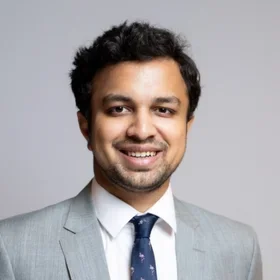As a child growing up in Cleveland, Ohio, alumna Shami-Iyabo Mitchell understood first-hand how medical mistrust affected her family and community. She recalls many of her family and friends being hesitant to go to the doctor’s office for fear of being mistreated.
Those observations would inspire her to earn a B.S. in Biology from Spelman College in 2019, then apply for the Columbia HBCU Fellowship Program which covered full tuition and housing for her to earn an M.S. in Bioethics in 2021. Ms. Mitchell, who stayed active with volunteerism and an internship in reproductive health research, ultimately credits Columbia’s Bioethics program with making her a much more competitive medical school candidate. When she becomes a medical doctor, she hopes to ease the anxiety and to restore the trust of those who are skeptical of the health care system in the U.S., and to provide care and resources to those in underserved, under-resourced, and marginalized communities. Ms. Mitchell is now in her first year at the David Geffen School of Medicine at UCLA. She reflected on her experience as a Bioethics student and Columbia HBCU Fellow.
The Columbia Bioethics degree was one of the things that distinguished me in the medical school interviewing process.”
How did you manage the medical school admissions process as a student?
While I was still completing my studies in Columbia’s Bioethics program, I was simultaneously studying for the MCAT and applying to medical schools. After I took the MCAT, I started getting invitations for secondaries, which is a second application after you've completed the essays for the primaries. I received my first interview invite from the Charles Drew University University of California Los Angeles Medical Education Program (CDU/UCLA). After completing the secondary application, I was invited for interviews from various schools and programs. After graduating in the spring, I'd pretty much been applying to schools, completing applications, and interviewing. I was working full-time and ultimately trying to make myself a better person holistically. At the end of the cycle, I was waitlisted at Cornell, Ohio State University, and Mount Sinai and I was accepted at UCLA, CDU/UCLA, Duke, Howard, Case Western, and Emory.
Who was your favorite professor in the Bioethics program?
Professor Jonathan Engel was my favorite professor—no shade to any of the other professors! I love Dr. Engel because he taught the Health Policy & Bioethics class in such a digestible fashion. It was my first time in a policy class, and I felt like I could actually comprehend and apply the information to understand the health care system. We were provided with tangible examples of how policy informs the work that many physicians and hospitals do.
Dr. Engel really opened my eyes to see that medicine is so much more than just providing health care to an individual. It's about creating systems for those who don't have as much access. Health care should be a right and not something that we're given because we can pay for it.”
What were the biggest benefits of the Columbia HBCU Fellowship Program?
The Columbia HBCU fellowship has a lot of benefits to it, but the one that jumps out is the fact that your master’s degree is fully paid. I come from a family of modest means, so it took a burden off of my parents; they did not have to take out loans for my graduate degree. Having your tuition paid for feels different as a student; you don't feel as bogged down or confined by finances. I hadn't experienced that before; in undergrad, I worked two jobs while also pursuing a science degree and becoming a member of Alpha Kappa Alpha Sorority, Inc.
To be able to take a breath and just learn and be a student was an amazing experience. The fellowship really showed me how important it is to remove finances as a barrier for students, especially those who come from low socioeconomic statuses.”
If you could select one part about your Columbia experience that was most beneficial to your medical school search, what would it be?
The interdisciplinary design of the Columbia Bioethics program gives students broad exposure to law, medicine, research, and philosophy. I had taken a philosophy course in undergrad, but I hadn't taken one as in-depth as the one that I was able to take at Columbia. I think that's what ultimately helped me when it came to medical school. I was able to relate both my medical and non-medical experiences to unconventional ideas and perspectives in the medical field.
During my medical school interviews, I was able to articulate how my undergrad and graduate school experiences will help to shape me into the physician that I hope to be for my future patients.


